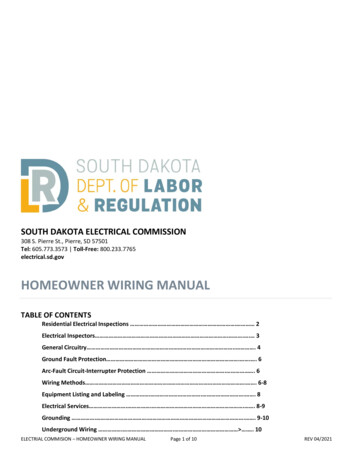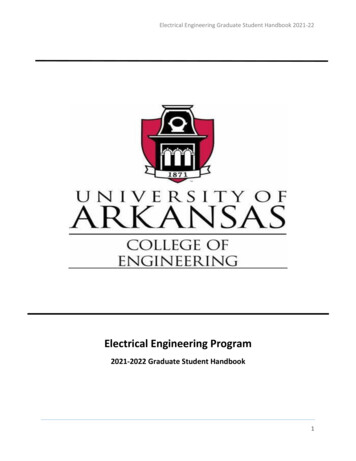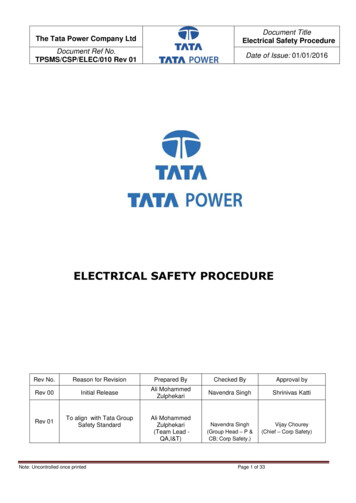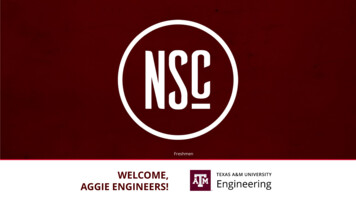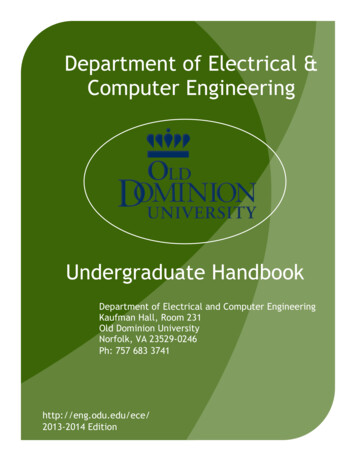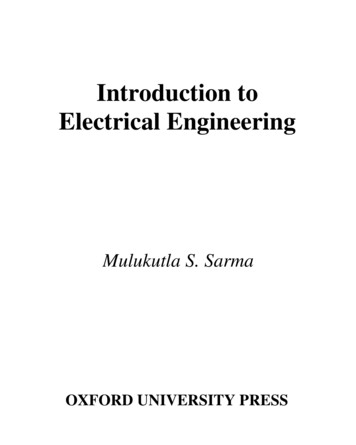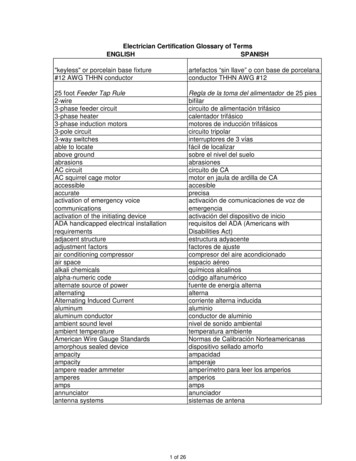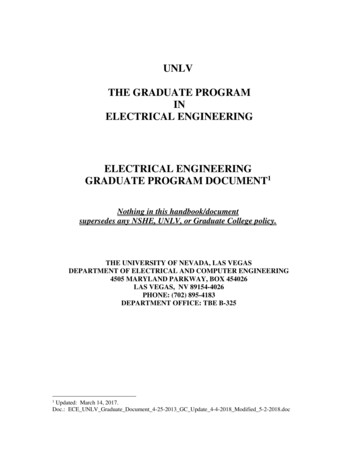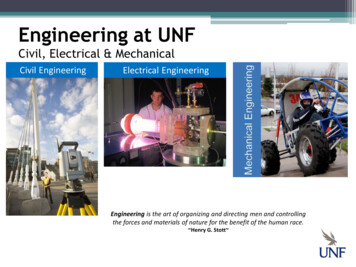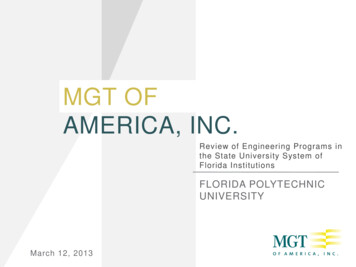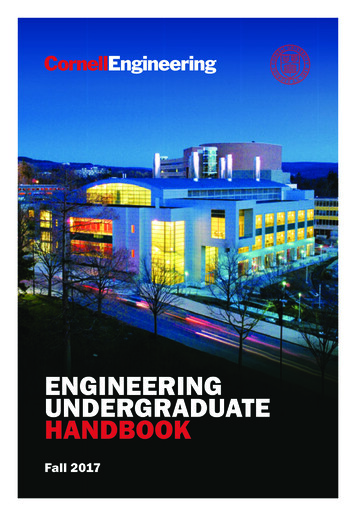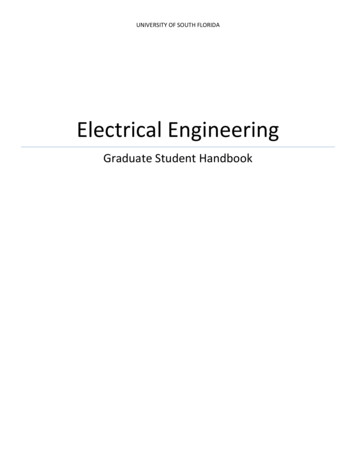
Transcription
UNIVERSITY OF SOUTH FLORIDAElectrical EngineeringGraduate Student Handbook
Welcome to the Department of Electrical Engineering at the University of South Florida! As the ElectricalEngineering Chair and Graduate Program Director we will work diligently to ensure you receive a world-classeducation in your chosen area of study. Please do not hesitate to seek our assistance and guidance at any timeas you progress through the program.Your time in graduate school can be one of the most fulfilling and rewarding experiences in your educational life.You will expand your technical knowledge and interact with student colleagues and faculty that share yourpassion for learning. You have selected a department with a committed faculty that has high expectations foryou, and instructional and research facilities that will prepare you for success as you move forward in yourcareers.We are honored that you have placed your trust and confidence in usChris Ferekides, PhDProfessor and Interim ChairElectrical Engineering DepartmentDrew Hoff, PhDProfessor and Graduate Program CoordinatorElectrical Engineering Departmentii
TABLE OF CONTENTSWELCOME AND GENERAL INFORMATIONMISSION AND CREEDGRADUATE STUDENT INFORMATIONELECTRICAL ENGINEERING POLICIES AND INFORMATIONACADEMIC INTEGRITYIII124MASTERS PROGRAMS INFORMATIONMSEE PROGRAM DESCRIPTIONCAPSTONE COURSESCREDIT HOURSGRADUATE COURSE PORTFOLIOTHESIS REQUIREMENTSMSEE WITH THESIS SEMESTER GUIDETHESIS GUIDELINES567781112DOCTORAL PROGRAM INFORMATIONDOCTOR OF PHILOSOPHY DEGREEPHD EXAMSCANDIDACYPHD SEMESTER GUIDE13141517GRADUATION AND UNIVERSITY INFORMATIONMSEE AND PHD GRADUATIONUNIVERSITY RESOURCES1819APPENDICESAPPENDIX A: ELECTRICAL ENGINEERING FACULTYAreas of Research Interest2029ii
The mission of the Electrical Engineering Department in the College of Engineering at the University of South Florida is toprovide a high quality education in electrical engineering for our students and practicing professionals; create newknowledge and solve real world problems via innovative research and disseminate this information for the benefit ofsociety; and to engage in effective regional, national and international service and outreach.Engineer’s Creed:As a professional Engineer, I dedicate my professional knowledge and skill to the advancement and betterment ofhuman welfare. I pledge: To give the utmost of performance; To participate in none but honest enterprise; To live andwork according to the laws of man and the highest standard of professional conduct; to place service before profit, thehonor and standing of the profession before personal advantage, and the public welfare above all other considerations.Code of Ethics: Institute of Electrical and Electronics Engineers, Inc.: We, the members of the IEEE, in recognition of theimportance of our technologies in affecting the quality of life throughout the world, and in accepting a personalobligation to our profession, its members and the communities we serve, do hereby commit ourselves to the highestethical and professional conduct and agree:1. To accept responsibility in making engineering decisions consistent with the safety health; and welfare of the public,and to disclose promptly factors that might endanger the public or the environment;2. To avoid real or perceived conflicts of interest whenever possible, and to disclose them to affected parties when theydo exist;3. To be honest and realistic in stating claims or estimates based on available data;4. To reject bribery in all its forms;5. To improve the understanding of technology, its appropriate application and potential consequences;6. To maintain and improve our technical competence and to undertake technological tasks for others only if qualifiedby training or experience, or after full disclosure of pertinent limitations;7. To seek, accept, and offer honest criticism of technical work, to acknowledge and correct errors, and to creditproperly the contributions of others;8. To treat fairly all persons regardless of such factors as race, religion, gender, disability, age, or national origin;9. To avoid injuring others, their property, reputation, or employment by false or malicious action;10. To assist colleagues and co-workers in their professional development and to support them in following this code ofethics.iii
General Graduate Student InformationUniversity Policies and InformationGraduate students are responsible for checking the links on the Graduate School websites as this information maychange from time to time and does govern the policies of the College of Engineering and the Department of ElectricalEngineering.Admissions: General graduate admissions information and policies may be found at the following website:http://www.usf.edu/admissions/graduate/ The Electrical Engineering website is athttp://www.usf.edu/engineering/ee/index.aspx. Please consult these websites for the latest information.USF Graduate School: Information regarding graduate study at USF may be found at http://www.grad.usf.edu. TheGraduate Catalog is available at this site, and includes all current University policies for Graduate Students including:admission, registration, tuition/fees, academic policies and regulations, University degree requirements and graduationinformation.Financial Aid: Financial assistance is available through the Office of Financial Aid. Students requiring such assistanceshould contact http://www.usf.edu/finaid for information.Parking Services/BullRunner: Parking and transportation information may be found at:http://usfweb2.usf.edu/parking services/default.asp. Please note that all parking at USF requires a permit and violatorswill be ticketed and/or towed at the owner’s expense. Permits may be purchased by logging onto OASIS. Failure to payparking violations will result in academic holds and an inability to register for classes. You may pay parking fines inperson at parking services or on their website (note: parking services does not accept cash or checks). The BullRunner isa free shuttle that runs routes across the campus. Please consult the website for current routes and schedules.Academic Computing/E-Mail Accounts: All students registered for courses at USF are eligible for a free student emailaccount from Academic Computing. To activate a student account, visit the University Network Access website athttps://netid.usf.edu/una/. You will need your “U” number to activate your NetID. Your NetID allows access to a varietyof services including myUSF/Canvas online courseware, open-use computing labs, free software downloads, and USFlibrary online services. If you experience problems with the website, please contact the IT Help Desk at 813-974-1222.Student ID Cards: For information on USF Card Services, see the website at: http://www.usf.edu/it/class-prep/usfcard.aspx. All USF students are required to obtain and carry a USF ID. The cost of this card is 10 and qualifies you forgraduate student privileges at the Tampa Library and at local businesses that provide student discounts.International Students: International Student and Scholar Services (ISSS) at USF is the main administrative and advisingoffice for approximately 1,400 international students and 200 research scholars from 130 countries. All necessary ISSSinformation is communicated to international students by ISSS (including a checklist). If you are an international studentyou should contact ISSS for important and useful information use once you arrive on campus.Office Location and Hours:USF Tampa Campus, Cooper Hall (4th floor), Room 469, Monday-Friday, 8:00 a.m. to 5:00 p.m. Contact at (813)974-5102 (phone)(813) 974-0491 (fax) and via email at internationalservices@usf.edu.Veterans: USF is approved for the education of veterans, eligible dependents, members of the selected reserve, andactive-duty personnel who are eligible for benefits under public laws in effect. All degree programs currently offered atUSF are approved by the State Approving Agency. Students who may be eligible for benefits are urged to contact1
Veterans Services for information, procedures, and forms as early as possible. To initiate, change, or renew benefits atUSF, a request must be submitted through Veterans Services. VA regulations require that students take only coursesthat are applicable to their degree program or other approved program and make satisfactory progress toward theirdegree. Students should consult the “Handbook for VA Students” (available at the USF Veterans Services office) or log onto USF Veterans Services web site http://www.veterans.usf.edu/index.asp for information on various programs andservices, and VA rules and regulations.Graduate and Professional Student Council (GPSC): The GPSC represents all graduate student interests pertaining toacademic issues in regular meetings with the USF President, Provost, Dean of Graduate Studies, the Graduate Council,Student Government, and other University Administrators. Advantages to joining the GPSC include: Staying abreast of current issues of importance to graduate studentsReceiving announcements on deadlines, scholarships, courses, etc. from USF facultyReceiving information on on-campus research positions and general job openingsReceiving announcements on current GPSC socials, seminars, and meetingsTo join the GPSC, visit “Organizations” in myUSF/Canvas or visit http://www.gpsc.usf.edu/Department of Electrical Engineering Policies and InformationStudent Registration InformationOASISLogin and Registration: To register for classes, students must login to the Student OASIS System athttp://usfonline.admin.usf.edu. Note: Florida law requires that all students enrolled in colleges and universities beimmunized against certain communicable diseases. Students who are not properly immunized or who do not have proofof immunization or an approved exemption (medical/religious) will have a registration hold placed on their account.Health history forms are available at orms.aspx. If you haveadditional questions, please contact the Immunization Compliance Office at (813) 974-4056 or email:immunization@shs.usf.edu. Additional information regarding all registration requirements may be found in theSchedule of Classes. Step-by-step instructions are available athttp://www.registrar.usf.edu/howtos/oasis student registration/.Continuing degree-seeking students register online during the preceding term for their next semester’s courses. Datesand instructions for all registration periods are published in the Schedule of Classes for the appropriate semester.Registered students may make schedule adjustments in the regular registration period during the preceding term orduring the drop/add period during the first week of classes. Degree-seeking students who do not register prior to thefirst day of classes may late-register the first week of classes. A late registration fee is charged during this week. Toavoid cancellation of registration, fees are due and payable for all registered courses of record on the fifth day of classes(end of drop/add period).Late Registration Fees: To avoid a late payment fee, all tuition and fees must be paid in person at the Cashier’s Office,on OASIS, or postmarked by the U.S. Post Office (not office metered), by the fifth day of the term. A student whoseregistration has been cancelled may request registration reinstatement through the fourth week of class for theacademic term. Upon approval for reinstatement, all fees and other debts owed to the University must be paid in full bycash, money order, check, or credit card before reinstatement will be effected. Students receiving financial aid mayreceive a deferment of their tuition fees until their aid is disbursed. Please verify this in OASIS to avoid a late paymentcharge.Graduate Petition to Add or Drop a Course Late: If a student wishes to add or drop a course after the registrationdeadline, s/he should obtain and complete a “Graduate Petition” and submit it through the Department’s Graduate2
Director (who will submit it to the College). This form (and others) can be obtained by going to the Graduate Schoolwebsite (www.grad.usf.edu) and clicking “Forms”.myUSF/Canvas Features: The University web portal, https://my.usf.edu, is a one-stop shop of online services providedvia the web for USF faculty, staff, and students. After logging into the myUSF site, you will first see the myUSF page, acustomizable personal page. At myUSF/Canvas, you can: 1) view course materials and grades (when available) byclicking on the “Courses” tab in the navigation menu, 2) check and send email using Gmail, 3) browse the USF userdirectory, and 4) link directly to OASIS. Other portal features beyond the myUSF page include links to: Course catalogs,Library resources, Information Technology, organizations on campus, a customizable Google Apps homepage, and otheruniversity-wide resources.Gaining Access to myUSF:1. From a web browser, visit https://my.usf.edu2. Login with your NetID and password (if you don't have a NetID, visithttps://webauth.usf.edu/login?service https%3A%2F%2Fnetid.usf.edu%2Funa%2F&gateway true and follow theinstructions).3. Once inside myUSF, browse through courses, communities, and resources by clicking the tabs at the top of the page.You may also modify the content and the layout to best suit your needs, and create a personalized home page at MyGoogle Apps @ USF where you can add links to your USF Gmail account,Important Academic Policies that Apply to All Electrical Engineering Graduate StudentsContinuous Enrollment: All graduate students must maintain continuous enrollment, defined as completing 6 hours ofgraduate credit within 3 consecutive semesters. Students who have advanced to candidacy must be signed up for twocredit hours (likely dissertation hours) each and every semester following advancement and through to the graduationsemester. This policy includes summers. Students who do not maintain continuous enrollment, as defined above, maybe dropped from the program and required to re-apply. More details regarding enrollment can be found in the graduatecatalog: 0and%20Policies/2011-2012/Section7 EnrollReq 20112012.html.In Good Standing: Electrical Engineering Masters students must maintain a USF/Overall grade point average of 3.0 (“B”)in all courses and meet the requirements of the degree program to be considered “in good standing”. Doctoral studentsmust maintain an overall grade point average of 3.25 in USF courses and meet the requirements of the degree programto be considered “in good standing”. No grade below a “C-” will be accepted toward a graduate degree. All gradesearned will be counted in computing the overall grade point average (GPA). Any student who is not in good standing atthe end of a semester shall be placed on probation. The College or Department may also place students on probation forother reasons. Notification of probation shall be made to the student in writing by the Graduate School, with a copy tothe Department and their advisor. A Graduate Assistant who is placed on probation will lose his/her assistantship.Academic Dishonesty Policy: The field of Electrical Engineering is based upon the integrity of those people working in it.It is assumed that students in the Department of Electrical Engineering will live up to the highest levels of academichonesty. All papers, research, and examinations will be monitored carefully and students found cheating will bepunished to the fullest extent allowed by the University and the Department. The Electrical Engineering Faculty hasvoted and approved a departmental academic integrity policy that all students are required to sign and submit to thedepartment as follows:3
4
USF Department of Electrical Engineering Master of Science (MSEE)MSEE Program DescriptionThe MSEE is a 30 credit hour program designed to provide the student with a high quality education in electricalengineering; create new knowledge and solve real world problems via innovative research and disseminate thisinformation for the benefit of society; and to engage in effective regional, national and international service andoutreach. Students in the Electrical Engineering Department can select an area of specialization in Biomedical,Communications and Signal Processing, Control Theory, Energy-Power, Microelectronics, or Wireless and Microwave, orfollow a broader course track through the MSEE with no concentration.MSEE Program Requirements*Thesis Option6 hours of EE approved Math Courses12 hours of sequence courses according tospecialization area6 hours of EE approved elective hoursNon-thesis Option6 hours of EE approved Math Courses12 hours of sequence courses according tospecialization area12 hours of project, elective or independent studyhours6 hours of ThesisMSEE PortfolioAll PhD students and MSEE students who are TAs must also take the EE Graduate Seminar course***All Electrical Engineering Graduate students are required to take only EE courses during their first semester. Followingthe first semester, with advisor and departmental approval, Masters students can take up to 6 hours of course workoutside the EE department.**The Graduate Seminar course is required to be taken by all PhD students once before the Doctoral Qualifying examand the second time prior to finishing the program. MSEE students are required to take the seminar one time only ifthey are Teaching Assistants for the department.The College of Engineering offers a Master of Science in Engineering Science through the Dean’s Office for students thatdo not have undergraduate degrees in an Engineering field. Further information can be found by contacting the Dean’sOfficeFurther details within the areas of specialization can be found at the following links:BiomedicalCommunications and Signal ProcessingControl TheoryEnergy-PowerMicroelectronicsWireless and Microwave5
Partial Listing of Capstone Courses for Non-thesis Students:Biomedical Systems:EEL 6935 BioelectricityEEL 6935 BioelectronicsEEL 6514 Biomedical Image ProcessingBioMEMS and Microsystems:MEMS: Micro-Electro-Mechanical SystemsEEL 6226Microsystems and MEMS TechnologyMicroelectronics:Materials, Processes and Devices:EEL 6935 Advanced IC TechnologyEEL 6353 Semiconductor Device TheoriesSystems and Design:EEL 6936 Intro to VHDLEEL 5357 Analog CMOS/VLSI DesignEEL 6935 System on a ChipEEL 6936 Rapid System PrototypingCommunication and Signal Processing:EEL 6752 Digital Signal Processing IIEEL 6586 Speech Signal ProcessingEEL 6597 Wireless Network Architectures and ProtocolsEnergy, Power Electronics, and Controls:EEL 6227 Electrical Machines and DrivesEEL 6936 Rapid System PrototypingWireless and Microwave:EEL 6427 RF and MW Circuits IIEEL 6481C Numerical ElectromagneticsEEL 6425 RF/MW MeasurementEEL 6430 MMIC Design6
Master's Program Credit HoursFor students writing a master's thesis, the minimum total number of credit hours is 30 (24 cr. hours of class work/6hours of thesis); and for course work students the minimum is 30 credit hours of class work (including capstone course).Students must register with a specific professor for thesis and independent study hours. Each professor will have theirindividual Thesis and Independent Study sections.PLEASE NOTE: The graduate program coordinator is responsible for evaluating the student's overall transcript to ensurethat the following distributional requirements are met:(i) Minimum two semesters of designated applied Mathematics courses(ii) Minimum 10 cr. hours of formal regularly scheduled 6000-level course work for thesis students (13 hours for coursework/comp exam and project students).(iii) Minimum 16 hours net of regularly scheduled classes, thesis, independent study, or directed research at 6000 level.(iv) At least two 6000-level courses must have a graduate course as a prerequisite (e.g.: EEL 6752Digital Signal Processing II [prereq. EEL 6502 Digital Signal Processing I]. This requirement covers all options(microelectronics, communications, controls, etc.) and whether or not a student is doing the thesis, project or coursework option.(v) The master's thesis must account for exactly 6 of the 30 credits required for thesis students.(vi) All students must be registered the semester of graduation for a minimum of 2 credit hours.Coursework Option Students: EE Students can elect to take the course work only without doing a thesis. Course workstudents must take 30 credit hours (ten courses). All students must maintain a minimum 3.0 GPA. Course work studentsmust complete at least one approved “capstone” course, and the Graduate Course PortfolioGraduate Course Portfolio(For Non-Thesis Master's Students in the Electrical Engineering Department)]Graduate students in the USF Electrical Engineering Department Non-Thesis Master's Program are required to compileand submit a Graduate Course Portfolio prior to graduation. This requirement does not apply to students who complete amaster's thesis or to continuing PhD students1. Students are encouraged to prepare a high quality Portfolio documentthat may serve them beyond the completion of their degree program as they pursue employment opportunities. ThePortfolio will summarize student accomplishments in the M.S.E.E. program and can be used to supplement informationthat is typically contained in a resume.The Portfolio is to be attempted the semester before the student intends to graduate, which is also when the graduationapplication is due. For the purposes of this document, this semester is referred to as the Portfolio Semester.The Portfolio will be assigned with one course that the student is taking during the Portfolio Semester. This is the PortfolioCourse, which will nominally be the 3 credit hour Electrical Engineering course with the lowest number that the student istaking during the Portfolio Semester. (Course numbers 5935/36 and 6935/36 are normally excluded from being PortfolioCourses.) Alternative Portfolio-course association arrangements will be made as necessary.It is extremely important that Portfolio contain ONLY original content. A Portfolio that is found to have non-originalcontent will receive a failing grade and the student will receive an F in the Portfolio Course. A second occurrence willresult in dismissal from the program. Students are encouraged to read the section below on Non-Original PortfolioContent.10
Content:The Portfolio must address the following outcomes of the master's (non-thesis) program:1. graduates will demonstrate an advanced level of knowledge in a primary defined area of specialization within electricalengineering.2. graduates will demonstrate an advanced level of knowledge in a second defined area of specialization within electricalengineering.3. graduates will demonstrate complex problem solving skills acquired by a mastery of subjects in advanced mathematics.For each outcome, i.e. Sequence 1, 2, and graduate mathematics (2 courses each), the Portfolio should contain a 0.5-1page essay explaining specifically how the outcome was obtained (e.g. what advanced level of knowledge in a primarydefined area of specialization was demonstrated), supported by an example of the student's course or project work thatsupports the claim of achievement. The example of course or project work should be appended to the page containingthe essay. The total length of the Portfolio should therefore be no less than 6 pages and not more than 10 pages, with themaximum length determined by the quantity of example work2. Note that a 1-page example of course or project work,e.g. a problem from an exam in a mathematics course, is sufficient given that it is of appropriate quality.Students are strongly encouraged to take courses necessary to satisfy the sequences and math requirements early in theirprograms. If a student has not completed the necessary courses by their Portfolio semester, he/she is still required toprepare a Portfolio that meets the length contents described above. In this case, the student should provide morecontent pertaining to the courses that they have completed, or are completing during the Portfolio semester.The Portfolio will be reviewed by up to three members of the EE faculty, and evaluated according to the overall quality ofthe writing, the clarity of the explanation of how the outcomes were achieved, and the quality of the examples that areincluded.Assessment:Students have a maximum of two opportunities to submit a passing Portfolio. If a student is required to make a secondattempt at the Portfolio requirement, it will be assigned during a semester after the first attempt was made. As thePortfolio represents the MSEE program comprehensive exam, a student who does not receive a passing grade on thesecond Portfolio attempt will be dismissed from the EE program. Students will not receive a third opportunity to submit apassing Portfolio.Score of 2.75 or higher: The student passes the Portfolio requirement and his/her final grade in the Portfolio Course is notaffected.Score 2.75 on first attempt: The student’s final grade in the Portfolio Course will be lowered by one full letter grade if thelow score is based on low Portfolio quality. The student will receive an F in the Portfolio Course if the EE evaluationcommittee determines that the Portfolio contains content that is not original, i.e. content that is plagiarized from anothersource.Score 2.75 on second attempt: The student will be dismissed from the MSEE program. In addition, the student’s finalgrade in the Portfolio Course will be lowered by one full letter grade if the low score is based on low Portfolio quality. Thestudent will receive an F in the Portfolio Course if the EE evaluation committee determines that the Portfolio containscontent that is not original.Non-Original Portfolio Content:The department has a zero tolerance policy regarding non-original content in Portfolios. The use of non-original content isa violation of the department’s academic integrity policy, and two violations of the policy result in program dismissal.Non-original content includes material that is plagiarized from another source. Copying a single sentence, or parts of asentence, from another source and using the material in the Portfolio is not allowed. Furthermore, if a student has usedplagiarized material from another source in a report or other assignment for a different course, that does not make itacceptable to then use the material in the Portfolio and claim it as one’s own work. The EE Department may useautomated plagiarism checking software, web searches or other means to determine if a Portfolio includes any nonoriginal content.1A continuing PhD student is defined as one who has completed the Doctoral Qualifying Exam in the ElectricalEngineering Department. An MSEE program is not considered to be completed until either a) the portfolio requirementhas been satisfied, or b) a master’s thesis requirement has been met, or c) the Doctoral Qualifying Exam has been passed.10
2The Portfolio document is expected to have a minimum of 6 full pages of content, with approximately 600 words perpage or 400 words and one figure. Portfolios which are found to have an insufficient amount of content will bedowngraded appropriately during the assessment.Thesis Student RequirementsMS thesis students are strongly advised when they BEGIN their thesis to familiarize themselves with the requirementsand associated deadlines found on the Graduate School website (http://www.grad.usf.edu/ETD-res-main.php).MSEE Major ProfessorStudents choosing the Master’s Thesis option should select a faculty advisor/major research professor by the end oftheir 2nd semester in the program. It is important that students meet and get to know the faculty member and theirresearch interests prior to selecting their advisor to ensure successful collaboration.Thesis Committee: Students working toward a thesis degree will have the benefit of a three-member committee,selected by the student and their faculty advisor. It is the responsibility of the student to find a faculty member thatagrees to be their thesis advisor. The committee will approve the plan for research, supervise the research, and read andapprove the thesis for content and format. The student and his/her major professor will identify the two other facultycommittee members jointly. The major professor must be from Electrical Engineering. If students have co-majorprofessors, at least one must be from Electrical Engineering. Only tenure-line faculty members can serve as chair or cochair of a thesis committee. A faculty member may not serve as a (sole) chair of a thesis committee until s/he has servedas a member or co-chair of a thesis to completion. A student who nominates a person from outside the EE departmentto serve as a member of the committee must submit a CV for that person.Once a proposed committee has been determined, a Supervisory Committee Form needs to be completed by thestudent and submitted to the committee members for signature. The student should submit the form to the GraduateProgram Assistant, who, if s/he approves the committee makeup, will maintain a copy in the student’s file and forwardthe original to the Dean’s Office in the College of Engineering. The committee appointment is official only after receivingCollege approval. An approved and current Supervisory Committee Form must be on file in the College beforegraduation may be certified. Committee forms need to be processed as early in the program as possible, but no laterthan the semester prior to graduation.Changes to the Supervisor Committee: Change of Committee Forms should be submitted for approval if the studentwants to change the makeup of his/her committee or the status of a member (e.g., changing a member to chair).Faculty members who are removed from the Committee are not required to sign the revised form, provided that theMaj
Graduate Student Handbook. ii . Welcome to the Department of Electrical Engineering at the University of South Florida! As the Electrical Engineering Chair and Graduate Program Director we will work diligently to ensure you receive a world-class education in your chosen area of study. Pleas
